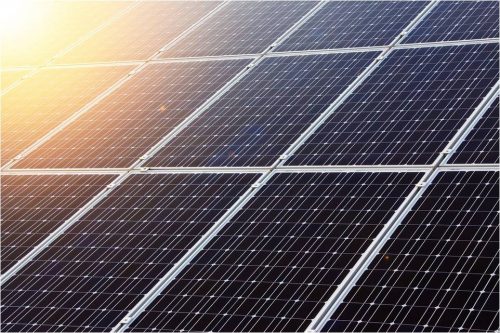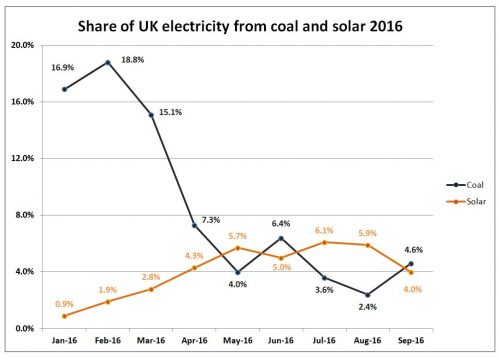For the first time ever, solar panels in the United Kingdom generated more electricity than coal-fired power stations in the 6 months to September.
From April to September 2016, solar panels produced an estimated 6,964 gigawatt hours (GWh) of the UK’s electrical energy – nearly 10 percent higher than the 6,342 GWh generated by coal.
These quantities represent 5.2 percent (from solar) and 4.7 percent (from coal) of the nation’s electricity demand for the 6-month period.
 New analysis reveals that for first time, solar panels generated about 10 percent more electricity than coal-fired power stations in the UK during April-September. Image: pixabay
New analysis reveals that for first time, solar panels generated about 10 percent more electricity than coal-fired power stations in the UK during April-September. Image: pixabay
The achievement rounds off “a historic half-year of firsts” that reflect the changing face of UK electricity supply, say climate change analysts Carbon Brief, explaining that:
– Saturday 9 April was the first-ever day where UK solar panels made more electricity than coal,
– May 2016 was the first-ever month,
– June-September was the first-ever quarter, and
– now April-September is the first-ever half year.
From 1 July, “there were 10 straight weeks when solar output exceeded that from coal,” say Carbon Brief.
Coal-generated electricity hit zero for first time
Two things are changing to cause this shift in the UK energy landscape. One is that solar capacity has increased significantly – in fact it doubled in 2015. The other is that coal-fired generation is in decline, and reached all-time lows this year.
For example, on the 9 April, coal-generated electricity fell to zero for the first time since 1882 when coal first started supplying the public with electricity. And since then, coal-generated electricity has been zero for a total of 199 hours.
 April-September saw four historic firsts – first-ever day, first-ever month, first-ever quarter, and first-ever half year, when solar panels generated more electricity than coal in the UK. Data: Carbon Brief.
April-September saw four historic firsts – first-ever day, first-ever month, first-ever quarter, and first-ever half year, when solar panels generated more electricity than coal in the UK. Data: Carbon Brief.
Coal-fired electricity has fallen because the wholesale energy market has shifted in favour of gas-fired generators. Plus, the UK’s carbon floor price doubled in April 2015, which also shifted the market in favour of gas.
However, Carbon Brief also point out that while gas-fired power stations have replaced most of the drop in coal-fired output, the total output from both fossil fuel sources is also falling.
“This is because of increases in electricity supplied by renewables and imports, along with falling demand,” they add.
The series of firsts is likely to be at an end for this year, since the seasonal nature of sunlight in the UK means a lot less output during the winter, and the rise in demand for heating and lighting means coal will likely overtake solar.
One way to overcome the seasonal effects of solar power is to develop more energy storage capacity. Frank Gordon, senior policy analyst at the Renewable Energy Association urges the government to take action to realize the great potential for energy storage in the UK:
“Our research indicates that there are multiple gigawatts of capacity that are being proposed or are ready to be developed, but a joined-up and supportive policy structure is critically needed.”

